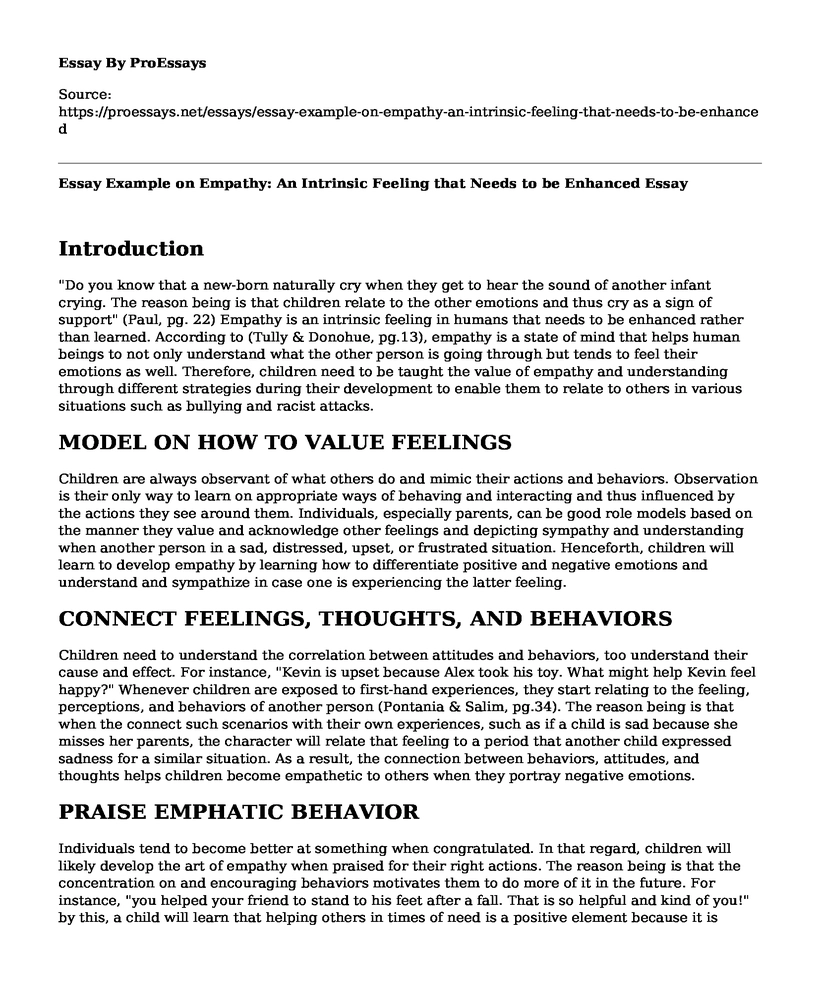Introduction
"Do you know that a new-born naturally cry when they get to hear the sound of another infant crying. The reason being is that children relate to the other emotions and thus cry as a sign of support" (Paul, pg. 22) Empathy is an intrinsic feeling in humans that needs to be enhanced rather than learned. According to (Tully & Donohue, pg.13), empathy is a state of mind that helps human beings to not only understand what the other person is going through but tends to feel their emotions as well. Therefore, children need to be taught the value of empathy and understanding through different strategies during their development to enable them to relate to others in various situations such as bullying and racist attacks.
MODEL ON HOW TO VALUE FEELINGS
Children are always observant of what others do and mimic their actions and behaviors. Observation is their only way to learn on appropriate ways of behaving and interacting and thus influenced by the actions they see around them. Individuals, especially parents, can be good role models based on the manner they value and acknowledge other feelings and depicting sympathy and understanding when another person in a sad, distressed, upset, or frustrated situation. Henceforth, children will learn to develop empathy by learning how to differentiate positive and negative emotions and understand and sympathize in case one is experiencing the latter feeling.
CONNECT FEELINGS, THOUGHTS, AND BEHAVIORS
Children need to understand the correlation between attitudes and behaviors, too understand their cause and effect. For instance, "Kevin is upset because Alex took his toy. What might help Kevin feel happy?" Whenever children are exposed to first-hand experiences, they start relating to the feeling, perceptions, and behaviors of another person (Pontania & Salim, pg.34). The reason being is that when the connect such scenarios with their own experiences, such as if a child is sad because she misses her parents, the character will relate that feeling to a period that another child expressed sadness for a similar situation. As a result, the connection between behaviors, attitudes, and thoughts helps children become empathetic to others when they portray negative emotions.
PRAISE EMPHATIC BEHAVIOR
Individuals tend to become better at something when congratulated. In that regard, children will likely develop the art of empathy when praised for their right actions. The reason being is that the concentration on and encouraging behaviors motivates them to do more of it in the future. For instance, "you helped your friend to stand to his feet after a fall. That is so helpful and kind of you!" by this, a child will learn that helping others in times of need is a positive element because it is something praised by their role models (Malti, et al.pg. 26). Therefore, praising empathetic behavior is an excellent strategy to help children develop the art of empathy during their developing stage.
CONCLUSION
Infants upon being born are similar to a blank page that gets filled up through observation of other behaviors and perceptions their role models depict towards others. Children have increased chances to become the person they mimic in life. In that regard, whenever a role model shows the art of empathy towards others, children will learn to differentiate between positive and negative emotions, which will subsequently help to relate to others in the case of the latter situation. The exciting part is that empathy is an intrinsic value that can only be enhanced rather than enlightened.
Works Cited
Malti, Tina et al. "School-Based Interventions To Promote Empathy-Related Responding In Children And Adolescents: A Developmental Analysis". Journal of Clinical Child & Adolescent Psychology, vol 45, no. 6, 2016, pp. 718-731. Informa UK Limited, Doi:10.1080/15374416.2015.1121822.
Paul, Annie Murphy. Your Brain On Fiction. 3rd ed., Free Press, 2014, pp. 1-34.
Pontania, Almira Rizki, and Rose Mini Agoes Salim. "The Relation of Child's Empathy and Parents' Prejudice: The Mediating Role of Parenting Style". Humaniora, vol 10, no. 2, 2019, p. 105. Universitas Bina Nusantara, Doi:10.21512/humaniora.v10i2.5476.
Tully, Erin C., and Meghan Rose Donohue. "Empathic Responses To Mother's Emotions Predict Internalizing Problems In Children Of Depressed Mothers". Child Psychiatry & Human Development, vol 48, no. 1, 2016, pp. 94-106. Springer Nature, Doi: 10.1007/s10578-016-0656-1.
Cite this page
Essay Example on Empathy: An Intrinsic Feeling that Needs to be Enhanced. (2023, Mar 02). Retrieved from https://proessays.net/essays/essay-example-on-empathy-an-intrinsic-feeling-that-needs-to-be-enhanced
If you are the original author of this essay and no longer wish to have it published on the ProEssays website, please click below to request its removal:
- Global Happiness
- Research Paper on Anxiety in Children
- Research Paper on Rising Mental Illness: A Global Challenge for Psychotherapy
- Research Paper on Exploring Psychological Elements in Film: Insomnia & Personality Disorders
- Essay Example on Growing Up: Russell Baker's Difficult Journey to Adulthood
- History of Autism & Tuberous Sclerosis: A Comparative Study - Essay Sample
- Report Example on Repressed Childhood Trauma







